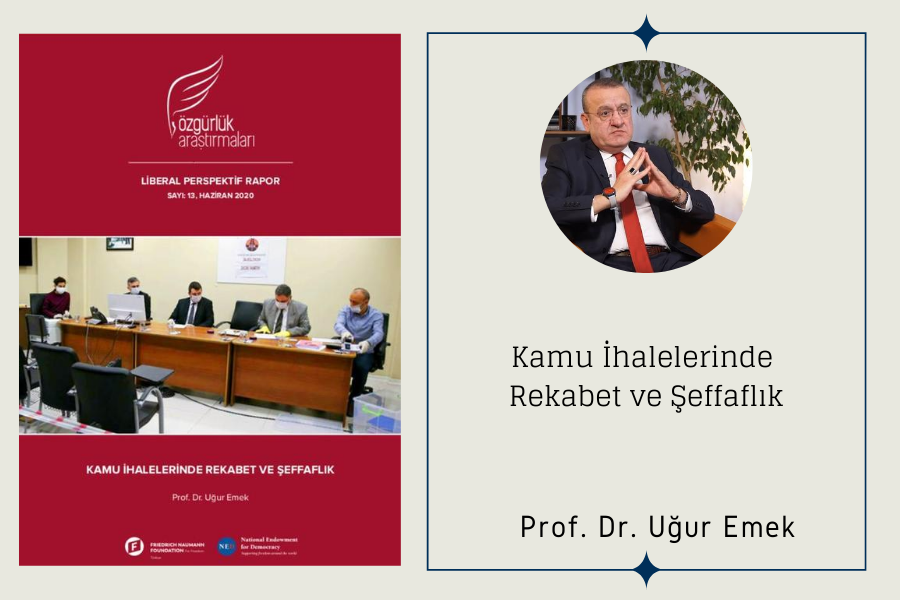As Turkey is falling behind in all the indexes of rule of law and governance in the world and since institutional/structural erosion took place in legal and administrative areas, Turkey should urgently be subjected to reform in these structures and institutions. In this conceptual framework, as Özgürlük Araştırmaları Derneği / Freedoms Research Association, with support of the National Endowment for Democracy and Friedrich Naumann Foundation -Turkey Office, we started the “Structural Reforms in Turkey Project” in the five main institutions/structures (Legislature, Judiciary, Public Procurement Regime, Public Personnel Regime and Media Independence) to identify existing problems and to concretize, where possible reform proposals will be given. As part of this project, the report titled “Competition and Transparency in Public Procurement” prepared by Prof. Uğur Emek identifies the existing risks and problems related to the Public Procurement Regime and proposes solutions.
The related report examines the historical background and development processes of the Public Procurement Law No. 4734, which was created to regulate the purchases of works, supplies or services and the management and execution of contracts, and Public Procurement Contracts Law No. 4735, giving details about the EU accession negotiations. The State Procurement Law No. 2886 was amended on the grounds that it could not respond to the changing and developing needs of today, that it was insufficient in eliminating the problems that arise in practice, that it did not cover all public institutions, that it did not comply with the European Union and international procurement practices, and that a comprehensive new law on public procurement was needed. Thus, Law No. 4734 replaced the provisions of Law No. 2886 regulating public procurement. In addition, Law No. 4735 was prepared to regulate the management and execution of public procurement contracts. However, the new law has been amended until today, ironically citing increasing competition and transparency and ensuring greater compliance with EU regulations; It has been changed approximately 186 times in 18 years.
After the detailed explanation of the information given above, the risk areas that may harm the efficiency in public procurement were determined and necessary regulations were made to mitigate the negative effects of these risks. Identified risks have been examined under ten titles; scope and exceptions, tender commissions, approximate cost, financial and technical competence, tender procedures, new tender procedures (competitive dialogue and innovation partnerships), tender and pre-sufficient documentation, evaluation of proposals, increasing international competition in tenders and reviewing complaints.
While the amendments made regarding the Law numbered 4734 had to be made by adding a provision to the Law or amending this Law, in fact, changes were made with other laws in a way that does not comply with the letter and spirit of this regulation. Besides, very large-scale public procurements were excluded from the scope of the relevant law. These exceptional and out-of-scope purchases are a matter of concern for competition and transparency. In the article regulating the establishment of the tender committee, the autonomy of the members is not sufficiently emphasized. The lack of autonomy regarding the duties of the members of the Tender Committee and the failure to take the necessary measures against the pressure that may be directed against them makes it difficult for the tender commission to work, leading to conflicts of interest in the commission.
Before the procurement of goods or services and construction works is made, the administration determines the approximate cost, excluding value added tax, by conducting all kinds of price inquiries and shows it on a chart of accounts with its bases. It is used in determining the approximate cost tender procedures, tender announcements, application of price advantage in favor of domestic bidders, allocation planning and control, qualification criteria and questioning extremely low bids. The approximate cost is kept confidential. In order to overcome the missing contract problem in tenders, the approximate cost must be calculated correctly and shared with the public. In practice, administrations are generally based on unit prices and market value which are determined and published by public institutions and organizations. However, such unit prices do not give real values because they are not updated. For these reasons explained, market research should be given importance in calculating the approximate cost, lifecycle costing should be made and these costs should be shared with the public transparently.
The share of negotiated procedure and exemptions in tender procedures in Turkey has been increasing in recent years. The fact that negotiated procedure which is an exceptional procedure referred to as the EU directive is gaining prevalence in Turkey is worrying. In addition, Law No. 4734 does not have innovative and flexible procurement procedures developed in EU directives. Among these new procurement procedures, competitive dialogue and innovation partnerships should be supported and used. Made possible with an amendment made in 2012, it is a decision against the basic principles of transparency, competition and equality to provide the allocation of the tender document only to those invited by the administration in the tenders that are not announced.
One of the innovations brought by Law No. 4734 was the transition from the lowest price criterion to the most economically advantageous bid criterion in the selection of the winning bid. However, the tendency of procurement authorities to use the "lowest price" criterion in practice causes them to ignore non-price factors such as operation and maintenance cost, cost effectiveness, efficiency, quality and technical value. In addition, a number of advantages are provided in favour of domestic bidders in public procurement in Turkey and this causes low foreign participation. This harms competition and efficiency, which are the main objectives of public procurement. Finally, it mentions about the examination of complaints regarding non-compliance with the provisions of the legislation in the transactions made by the contracting authority during the period from the beginning of the tender until the signing of the contract. With the amendment made in 2008, the authority of the Public Procurement Authority to review ex officio was removed and the scope of those who would complain was narrowed. This is a decision that seriously harms transparency and limits the individual's right to ask questions.
While Law No. 4734 was relatively in line with the EU regulations it modelled at the beginning, its numerous amendments have significantly damaged the principles of transparency, competition and equal treatment. In this context, it has made various suggestions to increase competition, accountability, transparency and equality, taking into account the risks in the areas specified in the report titled Competition and Transparency in Public Procurement:
- A glossary showing the similarity/difference of the terminology used in Turkish legislation from at least EU public procurement terminology should be prepared in order to allow international comparison.
- Arrangements should be made to reduce the exceptions to universal values and to expand the scope of Law No. 4734. In this framework, it should be considered that the changes to be made in the procurement laws should be approved by the qualified majority of the Turkish Grand National Assembly.
- Turkey has no equivalent of independent regulations of the EU on "concessions" and "procurement of enterprises operating in water, energy, transport and postal services sector”. These regulations, which are out of the Law No. 4734, should be introduced to the acquis.
- Regulations regarding the independence, impartiality and accountability of procurement commissions should be developed.
- Criteria for financial and technical competencies to be sought in tenderers should be improved in order to improve competition and equal treatment.
- The use of methods that restrict anti-competitive methods (bargaining procedure and direct procurement) should be restricted and the use of the tender procedure among certain bidders, which will reduce transaction costs, should be encouraged.
- In the tender planning, the application project should be done as much as possible and the lump sum delivery method should be adopted instead of the unit price method.
- In the evaluation of bids, instead of “the lowest price”, the “most economically advantageous bid method” should be adopted consistently. In addition, in the estimated contract value calculations; lifetime costing method should be taken as basis.
- Participation of foreign bidders should be encouraged in order to increase competition in tenders. State support / incentives mechanism should be used instead of procurement legislation to incentivize domestic companies and products.
- In order for the public procurement legislation to be implemented effectively;
- The Public Procurement Authority (PPA) should be able to examine claims of illegality ex officio,
- The scope of those who can complain to the PPA should be expanded,
- Complaint application fees should be set in a reasonable manner and level.
Click here to read the full report.









